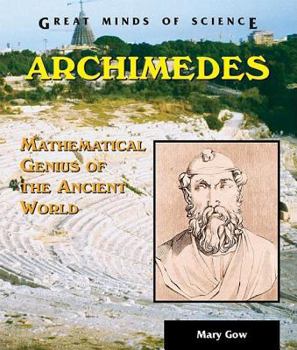Archimedes: Mathematical Genius of the Ancient World
(Part of the Great Minds of Science Series)
This book offers a look at one of the greatest minds of the ancient world. An original and profound thinker, Archimedes was a mathematician, a physicist, a mechanical engineer, and an inventor. He is... This description may be from another edition of this product.
Format:Library Binding
Language:English
ISBN:0766025020
ISBN13:9780766025028
Release Date:January 2005
Publisher:Enslow Publishing
Length:128 Pages
Weight:1.05 lbs.
Dimensions:0.5" x 7.6" x 9.0"
Age Range:10 to 17 years
Grade Range:Grades 5 to 12
Customer Reviews
1 rating
A Renaissance book for children
Published by Thriftbooks.com User , 14 years ago
This book is part of the Great Minds Of Science series and is more than just a biography of Archimedes. The target audience is elementary school to early middle school. We read this book as a family to our son in 2nd grade and there were many paragraphs that required explanation and discussion--but we enjoyed the discussion and found the book had many examples that were wonderful starting points for understanding Archimedes' work. The author has done an excellent job of not only presenting the life of Archimedes, but also giving historical background and detailed descriptions of his mathematical accomplishments and inventions. The ancient world at the time of Archimedes' life is presented along with the politics, wars, and the importance of the library at Alexandria to the dissemination of his works. The book devotes a chapter each to the law of the lever; Archimedes' principle (density and the story of the fake gold crown); circles and spheres (Archimedes considered this to be one of his greatest contributions; math at play--some math problems that have only been solved recently by computers; inventions (the Archimedes' screw, compound pulleys, and planetariums); the siege of Syracuse during which Archimedes was killed; and the palimpsest, a manuscript which is now in the posession of the Walters Art Gallery in Baltimore. In the chapter on the law of the lever I would have liked to have seen a couple of illustrations accompanying the text. This is one topic where a picture or two would have helped out. There is a photo later of children on a seesaw and an example in the text that works well with the photo. The idea is presented and the author did try to carefully describe the concept, but sometimes words alone aren't enough. The explanation of the Archimedes' principle was well presented, but one section was written in a confusing way. Specifically the description of objects of varying densities immersed in water. Subsequent examples clarify a section that could have used one more round of editing. Almost all readers will get lost and confused in the middle of this section and it will require multiple readings before the simple beauty of the idea shines through the muddy prose. The chapter on circles and spheres describes how Archimedes computed pi--and introduces irrational numbers. The presentation is done in a way that fuels curiousity about numbers, and even though our second grader will not study irrational numbers for a grade or so, the concept has taken firm hold. This chapter was also a great starting point for a discussion on squares and square roots. There is an excellent activity at the end of the book for memorizing the first 25 digits of pi by singing to the tune of Mary had a Little Lamb. The chapter on math at play had a most interesting discussion of alternate theories of the cosmos--there were some thinkers (Aristarchus of Samos) that believed the earth orbited the sun. The book has chapter notes and reference





